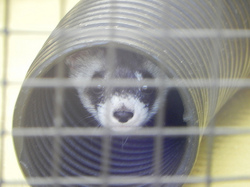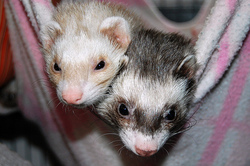Ferrets can make great pets when they are well-cared for and have an enriching environment

Photo by Flickr user USFWS Mountain Prairie
Their scientific name is Mustela putorius furo and they are in the weasel family (similar to minks). They were first domesticated by people many hundreds of years ago. In the United States, most ferrets come from large commercial breeding farms and will have already been spayed or neutered by the time they reach the pet store.
They are fun and playful, but they are not for lazy pet owners.
Their diet is very particular, and they are incredibly adventurous — inexorably drawn to destroy objects that are either expensive to you or harmful to them. However, if you know how to take care of them properly, they can make great family pets.
Housing:
Ferrets can be kept as single pets, but they will usually thrive in groups of two to four.
Most pet stores sell excellent multi-storied wire cages that have solid plastic flooring. These set ups are great. Keep them in a room with moderate temperatures, as ferrets can suffer heat stroke if the ambient temperature is over 80 degrees.
You will want to add a hammock or shirt for them to snuggle up in. Be careful to watch them when they are first given cloth, because a small percentage of ferrets will try to devour cloth (which can kill them if the cloth blocks their gastrointestinal tract). They will also appreciate large PCV tubes and cardboard boxes, which they can climb through and destroy safely.
More than 90 percent of ferrets can be successfully litter trained. See which corner they like to use, and put the litter box/boxes there. Use a litter that is not clay based, like pelleted litters or Carefresh. Clean the litter box at least once per day. They are good at using their boxe, but bad at covering up their mess (that's where most of the "ferret stink" comes from). Ferrets with owners who clean their boxes regularly rarely complain of odor issues.

Photo by Flickr user USFWS Mountain Prairie
Toys are excellent inside and outside of the cage, but must be given with caution. Ferrets (especially young ferrets) are very prone to eating chunks off of toys. If these chunks get stuck in their intestines, they will require emergency surgery to remove them (which is hard on them and on your wallet). An intestinal blockage is fatal if left untreated in most cases.
When selecting toys, the main things to avoid are anything rubber or anything with small parts (eyes/noses on stuffed animals). Good toys include ping-pong balls, stuffed toys with no removable bits, hard nylon toys, metal balls, pipes, tubes, cardboard.
Ferrets spend a lot of time sleeping, but when they're up, they want to play. They should definitely be given play time outside of their cages every day, but this must be done under supervision. They will want to climb into and on top of everything.
Ferret proofing involves making sure there are not little pieces they could swallow or rubber laying around (shoes), blocking the bottoms of couches/recliners, covering vents and making sure your valuables are well guarded. Having a litter box in their play area is a good idea, because they usually won't bother to go all the way back to their cage to do their business.
Diet:
Ferrets are strict carnivores. They have almost no ability to digest sugars, fibers and other plant material, so don't give them any. There are many diet recommendations for ferrets including raw meat, whole prey, cat food, ferret formulations, etc. There are pros and cons to most of these formulations, so I highly recommend that you ignore the internet and just buy them a high quality food labeled only for ferrets (Marshall's, Totally Ferret, Evo).
With any ferret food, you want to check and make sure that it has 30-40 percent protein and about 20 percent fat. A fatty acid supplement such as Ferratone or Linatone can be offered daily to help supplement their diet and keep their coats beautiful.
Cat hairball preventative such as Laxatone or Petramalt (1/2 inch ribbon) should be offered every other day. Hairballs are a huge problem in ferrets, especially as they get older. You generally won't see them bring up these hairballs, but they can grow large and cause an obstruction just like a piece of a rubber toy.
Small amounts of meat-based treats are a good addition to the diet and should be offered every few days (only a few teaspoons at a time).

Photo by Flickr user tribbles1971
Grooming and veterinary care:
Nail trims should be done regularly. Your veterinarian can teach you how if you don't feel comfortable trying on your own. Have a bottle of Kwik-Stop ready (Murphy's law says that if you don't have it, you're going to need it).
Ferrets can have baths with a shampoo labeled for kittens, but they shouldn't have more than one every two weeks.
Ferrets under 3 years old should be seen by a veterinarian at least once per year. They will do an exam, check the feces for parasites, check the ears for ear mites and vaccinate them against distemper virus and rabies. They may need occasional dental cleanings along the way. Monthly heartworm prevention is also very important.
After 3 years of age, degenerative diseases begin to show up. Unfortunately they are prone to a number of different types of cancer, heart disease and hormonal imbalances as they get older. At this time we begin to recommend that they get an exam every 6 months and have bloodwork performed at least once per year.
Additional exams are necessary as problems arise. Please bring your ferrets in to a vet if you see anything unusual, including diarrhea (especially if green), not eating, hair loss, large vulva, difficulty peeing, low energy, pale gums, weakness, seizures, itching, difficulty breathing or lumps. Ferrets can catch the flu from humans, so please try not to expose them if you get sick.
Ferrets usually live to be 5-11 years old. Keeping them healthy involves giving them a safe and enriching environment, feeding them a good diet and treating any medical problems quickly. Ferrets have brought a lot of joy to many people's lives.
Dr. Lyssa Alexander treats small and exotic animals and pocket pets at All Creatures Animal Clinic.

